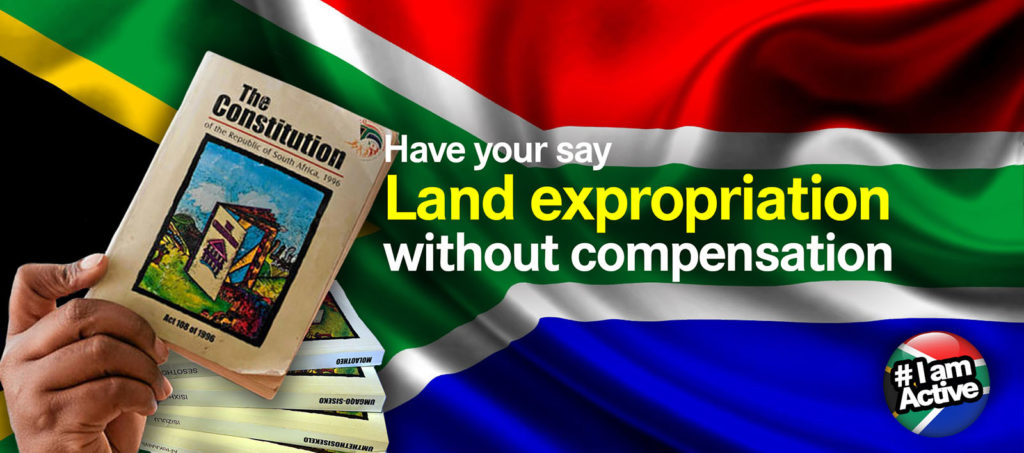
Warnings that proposals to amend South Africa’s Constitution to facilitate land expropriation and transfer wealth to the have-nots will damage the country have fallen on deaf ears. One after the other, South Africa’s pre-eminent scholars, thought leaders and business strategists have tried to highlight that South Africa will head down the same path Zimbabwe has taken into ruin if we press ahead with the same laws and policies instituted in the Mugabe era. But, there has continued to be a strong push for the legislation by individuals within the ANC and the Economic Freedom Fighters. In this sobering piece, entrepreneur and economist Lawrence McCrystal distils the problems with the proposal into eight simple, compelling reasons why South Africa should ditch the idea of land grabs – and fast. – Jackie Cameron
By Dr Lawrence McCrystal*
I lodge my objection to this proposed amendment to the Constitution on the following grounds:
It is unnecessary as existing legislation is adequate for land restitution.
It will undermine the very investment we desperately need in SA to get our economy going. Investors will not invest here if there is a threat of the government expropriating, without compensation, the property on which they have built their projects.
It could well put SA on the same path as Zimbabwe with equally catastrophic results.
It will be wide open to abuse as we have seen in Zimbabwe where people with influence got land which they could not use productively, while chasing productive farmers away, resulting in famine.
91% of the people offered land or money for restitution purposes have chosen the money. So this new proposal is not going to achieve anything in terms of helping the people, in their view. Furthermore the vast majority of those who did take the farm land have left it devastated. If that is what happened to farm land what will happen if this government, armed with this proposed amendment, were to start expropriating our urban properties. It will be catastrophic, given the poor track record of this government over the past 10 years.
The priority in SA right now is to get the economy growing so that the 10 million, or more, people who are unemployed can get work and so be helped out of their poverty. This proposed amendment to the Constitution is coming at exactly the wrong time. In fact the timing could not be worse. It will, as just one example, cause the loss of our preferential access to US markets in terms of the AGOA agreement. That will add hugely to the unemployed work force.
In a survey of the needs of our people, by the Institute of Race Relations, the highest proportion saw unemployment as the most pressing issue facing the country. Only a tiny fraction (1%) mentioned land. It is NOT an important issue in the eyes of the vast majority of our people. So where is the pressure for this proposed change in the Constitution coming from other than from self-centred politicians? A high proportion of SA’s politicians already have a poor reputation in thinking circles of the public both in SA and overseas. This proposal is, as a result, viewed with deep suspicion that the main motivation is not the interests of the people of SA. If it was then measures to stimulate economic growth, which were announced earlier this year by President Ramaphosa, would have been implemented by now and priority would not have been given to this unnecessary proposal. This in itself makes the motivation suspect. Priority is being given to something which is not a priority in the view of the vast majority of our people, at the expense of what is the priority namely economic growth and increased employment. Deregulation of small and medium enterprises, mentioned in the President’s earlier speech, will be hugely stimulative. That’s a priority. Yet nothing has been done, but they find time and energy for this amendment to our excellent Constitution.
Should this proposed amendment become law, this nation will live to regret it was ever proposed. In fact this government that has proposed it will be cursed for generations to come as favouring selfish, greedy interests instead of righteously serving the people and helping a huge proportion of them out of their poverty.
I submit this with great sadness, as an 83 year old citizen of this wonderful country who has dedicated his life to promoting its economic development and helping our people to become self-sustainable, because I foresee clearly, and have a deep sense of foreboding, that nothing but serious trouble and even evil will come of this amendment should it become law.
For the last half a century Lawrence McCrystal has played a part, as an entrepreneur and economist, promoting industrial and business development, both as a member of the IDC Board (for 18 years) and in numerous other public and private sector roles.










Expropriation Bill
The Expropriation Bill was another legislative piece that was on Friday approved for comment by Cabinet.
Mthembu said the Bill has been enhanced by inputs from the extensive consultation with the public and from different formations.
“Once passed into law, the Bill will provide uniform procedures to be followed when effecting the expropriation. It provides a legal framework for government departments and other organs of state in the three spheres of government to apply uniform land and other infrastructure expropriation procedures,” he said.
The bill will see the amendment of Section 25 of the South African Constitution.